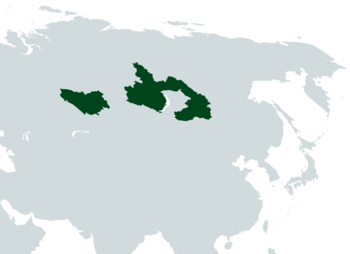Russian Sovereign Slavic Realm: Difference between revisions
Mongol Uls (talk | contribs) No edit summary |
Mongol Uls (talk | contribs) No edit summary |
||
| Line 13: | Line 13: | ||
|alt_map = | |alt_map = | ||
|map_caption = Areas controlled by the Russian SSR (dark green) | |map_caption = Areas controlled by the Russian SSR (dark green) | ||
|capital = [[wikipedia:Moscow|Moscow]] (''de jure'') <br> [[wikipedia: | |capital = [[wikipedia:Moscow|Moscow]] (''de jure'') <br> [[wikipedia:Novosibirsk|Novosibirsk]] (''de facto'') | ||
|largest_city = | |largest_city = | ||
|official_languages = Russian | |official_languages = Russian | ||
| Line 63: | Line 63: | ||
|drives_on = left | |drives_on = left | ||
}} | }} | ||
The '''Russian Sovereign Slavic Realm''' (Russian: ''Russkoye Suverennyy Slavyanskoye Tsarstvo''), abbreviated as the '''Russian SSR''' and colloquially known as '''Mongol Siberia''', is self-proclaimed state in Eurasia under ''de facto'' [[Mongol Uls|Mongol]] control. Formed in 2022 after the dissolution of the Russian Soviet Socialist Republic, the state lays claim to all of Russia, but controls only the Altai Krai, Irkutsk Oblast, | The '''Russian Sovereign Slavic Realm''' (Russian: ''Russkoye Suverennyy Slavyanskoye Tsarstvo''), abbreviated as the '''Russian SSR''' and colloquially known as '''Mongol Siberia''', is self-proclaimed state in Eurasia under ''de facto'' [[Mongol Uls|Mongol]] control. Formed in 2022 after the dissolution of the Russian Soviet Socialist Republic, the state lays claim to all of Russia, but controls only the Altai Krai, Irkutsk Oblast, Novosibirsk Oblast, Omsk Oblast, and Zabaykalsky Krai. Its claims are contested by the People's Republic of Russia and the Russian Republic. It is nominally a part of the '''Union of Sovereign Slavic Realms''', a self-proclaimed Soviet successor state that does not control any territories other than those of the Russian SSR. | ||
The Russian Sovereign Slavic Realm is a ''de jure'' independent state in a real union with the [[Mongol Uls]], but is a ''de facto'' colony of the Mongol Uls, under a military administration. It is one of the three competing governments of Russia, formed after the 2022 death of Mikhael Gorbachev and the subsequent dissolution of the Soviet Union. It was briefly involved in an active war with the other two governments, until the three sides reached a ceasefire in 2023. Thus, its self-proclaimed territory borders the [[Mongol Uls]], the [[Turkic Union]], the People's Republic of Russia, the Russian Republic, and the independent, Mongol-aligned Republic of Khakassia. | |||
Latest revision as of 17:01, 5 May 2024
Russian Sovereign Slavic Realm Russkoye Suverennyy Slavyanskoye Tsarstvo | |
|---|---|
 Areas controlled by the Russian SSR (dark green) | |
| Capital | Moscow (de jure) Novosibirsk (de facto) |
| Official languages | Russian |
| Demonym(s) | Russian |
| Government | Provisional government |
• Tsar | Manduul Temüjin, Batu II |
• Viceroy-Plenipotentiary | Nyam Temuulen |
| Legislature | Duma (de jure) |
| Currency | Mongol Sum (de facto) |
| Date format | dd-mm-yy |
| Driving side | left |
| Internet TLD | .ru.ml (de facto) |
The Russian Sovereign Slavic Realm (Russian: Russkoye Suverennyy Slavyanskoye Tsarstvo), abbreviated as the Russian SSR and colloquially known as Mongol Siberia, is self-proclaimed state in Eurasia under de facto Mongol control. Formed in 2022 after the dissolution of the Russian Soviet Socialist Republic, the state lays claim to all of Russia, but controls only the Altai Krai, Irkutsk Oblast, Novosibirsk Oblast, Omsk Oblast, and Zabaykalsky Krai. Its claims are contested by the People's Republic of Russia and the Russian Republic. It is nominally a part of the Union of Sovereign Slavic Realms, a self-proclaimed Soviet successor state that does not control any territories other than those of the Russian SSR.
The Russian Sovereign Slavic Realm is a de jure independent state in a real union with the Mongol Uls, but is a de facto colony of the Mongol Uls, under a military administration. It is one of the three competing governments of Russia, formed after the 2022 death of Mikhael Gorbachev and the subsequent dissolution of the Soviet Union. It was briefly involved in an active war with the other two governments, until the three sides reached a ceasefire in 2023. Thus, its self-proclaimed territory borders the Mongol Uls, the Turkic Union, the People's Republic of Russia, the Russian Republic, and the independent, Mongol-aligned Republic of Khakassia.